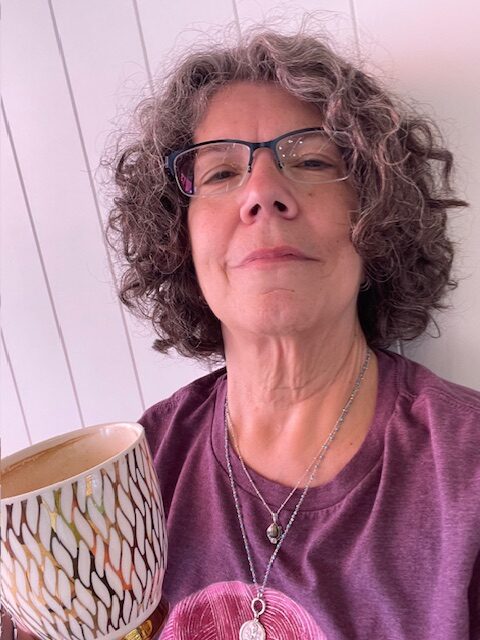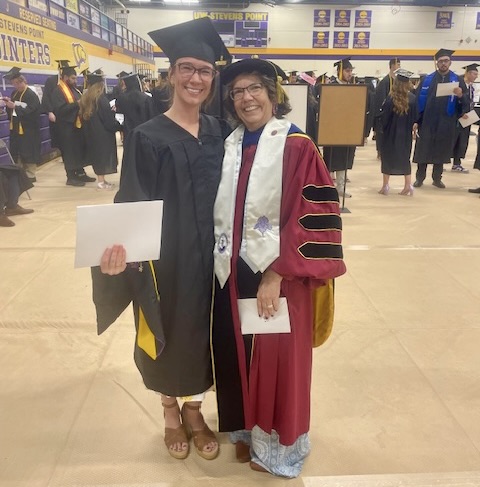Dr. Jodi Olmsted brings a lifetime of experience to the University of Wisconsin Master of Science in Healthcare Administration. With an extensive background in dental hygiene and consulting, Jodi teaches multiple courses in the 100 percent online program, including the capstone and pre-capstone courses.
The capstone project takes everything students have learned throughout the program and gives them the opportunity to apply these concepts in a real-world setting. Jodi is passionate about being a mentor to her students as they work to complete their projects:
“I would say, through this entire process, that I’m also just as much the mentor champion as people are going through these roles,” she said. “Because I have that lifetime of experience, and because I’m outside of your organizations, it helps for neutrality and an opportunity to help see things that, when you’re internal, sometimes you don’t see. So that you can bring something full circle and be proud of your final outcomes and what you produce for organizations.”
Jodi is an academic director for the Healthcare Administration program and professor in the School of Health Sciences and Wellness at UW-Stevens Point, where she earned her BS in Biology. She also earned her AAS in Dental Hygiene from Northcentral Technical College and is a registered dental hygienist. Her three graduate degrees are all in education, including her PhD from the University of Minnesota.
In her free time, Jodi enjoys traveling, reading, and cooking. She’s also an adviser and coach for the Curling Association of UWSP, with her students having won multiple national championships.
In the following Q&A, we sat down with Jodi to learn more about what Healthcare Administration students can expect from the capstone project.
What’s the most common question or concern that students have regarding the capstone?
Number one is, “What’s the expectation as far as the capstone itself?” And truly what you’re doing is an applied experiential project where you are able to marshal and use all of the skills from the courses that you’ve had through the program up until this point to resolve a problem at an organization. This can certainly be at your own workplace. So that’s one of the main questions we get.
The other one is “What’s the time commitment?” Or “How much time and energy am I putting into this applied project?” The expectation is that it’s about 150 hours. One thing we like to make clear is that this is something you’re doing for organizations—whether it’s your own company or someone else—where they don’t have the administrative bandwidth to do the projects themselves that they’d like to do. So it’s an opportunity to advance the mission, vision, and values of organizations, or to resolve or come up with suggestions for complex problems.
 When should I start preparing for my capstone project?
When should I start preparing for my capstone project?
You don’t need to be focused on your project until you’re through the middle two-thirds of the program and really absorbing what you’re learning and thinking about in an applied manner. Not just in a philosophical framework, but really engaging with the information that you’re learning and considering, “How would I use this at the organization I’m with? How would I apply this information?”
Once you start the HCA 770: Organization Development and Strategic Leadership in Healthcare course, you will begin doing the preparatory work leading to your pre-capstone and capstone courses. You will do a four-part project report in the Organization Development course, and oftentimes there’s both a given scenario that people can use if you’re not working for a professional healthcare organization.
What types of capstone projects have students completed in the past?
The projects themselves run the gamut. Anything from developing processes and procedures, developing new policies, training materials, data analysis and recommendations for changes, whether it’s for electronic health records or for clinical practice modifications to make sure that the quality of care and the quality of life of patients and clients that are being served is improved upon. There’s educational-type programming that has also been done, and there are employee policy handbooks that have been revised or developed from scratch.
Get Program Guide
Learn more about our 100% online degree and certificate programs.

What if my project doesn’t go as planned or something unexpected happens?
One of the things that’s a real important expectation as we’re moving through the capstone project is that you’re doing a routine check-in with me, because that project proposal drives all your work.
For the project to be successful, every goal and the project deliverables have to be accomplished. If you say you’re going to develop a handbook, the handbook is part of what you’re presenting to, not only for the purposes of the class, but to the organization that you’re doing that for. If you’re doing a flow chart and a series of change processes, then that would be part of those deliverables.
We try to look at phasing projects because we can’t always do everything in one step—sometimes things take a longer period of time. One of the things that we do, though, is what I call routine check-ins. And that can be a phone call or a text. I have a weekly meeting on Zoom for the capstone group where it’s a standing half-hour. You can hop on, we can talk, and brainstorm.
Communication between everyone is so important. If we don’t have that communication and you hit a wall and there’s an issue, I can’t help people to overcome that or find a pivot point where we can still have a positive outcome.
What’s the number one thing you want students to know about the capstone?
This is one of the things that, for me, is very much my educational philosophy: You need to focus on learning, not the grade. As an instructional designer and someone with three graduate degrees in adult education, I design a course for you to learn from and with, but you have to do the work to learn. If you take the time to use my bookings calendar and to meet with me, I’m here to help you. So I think that’s probably one of the biggest things.
Interested in learning more about the online University of Wisconsin Master of Science in Healthcare Administration? Contact an enrollment adviser at 608-800-6762 or learn@uwex.wisconsin.edu.









